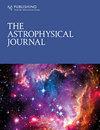北极支线的宽带无线电研究:光谱转换的起源与x射线和伽马射线光谱的见解
IF 5.4
2区 物理与天体物理
Q1 ASTRONOMY & ASTROPHYSICS
引用次数: 0
摘要
北极星突(NPS)是一个巨大的结构,在射电和x射线全天空图上都清晰可见。我们分析了覆盖22 MHz至70 GHz范围的宽带无线电观测,系统地分析了与NPS相关的热/非热发射。我们证明了NPS的无线电发射包括同步辐射、自由辐射和尘埃发射;然而,同步加速器的辐射比其他辐射占优势,特别是在银河系高纬度地区。在N (γ)∝γ−s (s≈1.8-2.4)到几GHz处,同步加速器的光谱表现为幂律行为,在ν brk≈1 GHz处有一个过渡,在此过渡处光谱指数s减小1。假设翻转是由于电子在逃离(或平流)发射区域之前被同步辐射冷却,如果NPS是靠近银河系中心(GC)的遥远结构,则磁场强度可估计为B ~ 8 μ G。然而,如果NPS靠近本地超新星遗迹(SNR),则需要不合理的强B ~ 114 μ G。在GC情景下,NPS中相应的非热能量为E n/ s≃4.4 × 10 55 erg,而E n/ s≃4.1 × 10 52 erg难以用单一的局部信噪比解释。我们还通过宇宙微波背景的逆复合估计了与NPS相关的伽马射线发射,在GC模型中,它的峰值为100-1000 keV,通量为ν F ν ~ 10−9 erg cm−2 s−1 sr−1,可能是未来x射线/伽马射线天文台探测的良好候选。本文章由计算机程序翻译,如有差异,请以英文原文为准。
Broadband Radio Study of the North Polar Spur: Origin of the Spectral Turnover with Insights into the X-Ray and Gamma-Ray Spectra
Abstract The North Polar Spur (NPS) is a giant structure that is clearly visible in both radio and X-ray all-sky maps. We analyzed broadband radio observations covering a range between 22 MHz and 70 GHz to systematically analyze the thermal/nonthermal emissions associated with the NPS. We demonstrate that the radio emission of the NPS comprises synchrotron, free–free, and dust emission; however, synchrotron emissions dominate over other emissions, especially at high Galactic latitudes. Moreover, the synchrotron spectra exhibit a power-law behavior with N ( γ ) ∝ γ − s ( s ≃ 1.8–2.4) up to a few GHz moderated by a turnover at ν brk ≃ 1 GHz, above which the spectral index s decreases by one. Assuming that the turnover is due to the electrons being cooled by synchrotron radiation before escaping (or advecting) from the emission region, the magnetic field strength can be estimated to be B ∼ 8 μ G if the NPS is a distant structure that is near the Galactic center (GC). However, an unreasonably strong B ∼ 114 μ G is required if the NPS is near the local supernova remnant (SNR). The corresponding nonthermal energy stored in the NPS is E n/th ≃ 4.4 × 10 55 erg in the GC scenario, whereas E n/th ≃ 4.1 × 10 52 erg is difficult to explain with a single local SNR. We also estimated the gamma-ray emission associated with the NPS through inverse Comptonization of the cosmic microwave background, which peaks at 100–1000 keV with a flux of ν F ν ∼ 10 −9 erg cm −2 s −1 sr −1 in the GC model, and may be a good candidate for detection by future X-ray/gamma-ray observatories.
求助全文
通过发布文献求助,成功后即可免费获取论文全文。
去求助
来源期刊

Astrophysical Journal
地学天文-天文与天体物理
CiteScore
8.40
自引率
30.60%
发文量
2854
审稿时长
1 months
期刊介绍:
The Astrophysical Journal is the foremost research journal in the world devoted to recent developments, discoveries, and theories in astronomy and astrophysics.
 求助内容:
求助内容: 应助结果提醒方式:
应助结果提醒方式:


